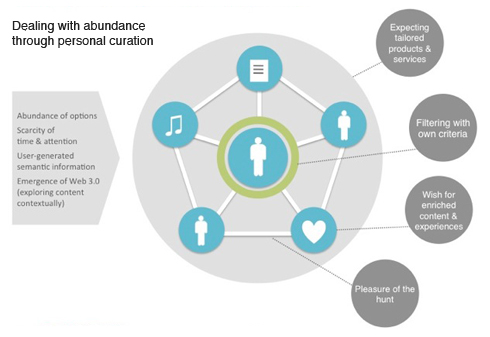Claro Partners' project Changing Models of Ownership and Value Exchange sought to understand how the concept of ownership and its transfer have changed – and are changing – in recent years. This is one of three short articles which Shareable will publish this month, featuring content from Claro's latest work.
Following the past two weeks' posts about their study into changing models of ownership and value exchange, Claro Partners continues to present some cases which illustrate ways in which companies are trying to provide solutions and capitalize on issues that arise from a world seeing changes provoked by technology and shifts in behavior.
Continuing the thread from last week, Claro delves into the realm of personal data ownership, both online and offline. They consulted with Nick Noles, an expert in the field from the Department of Psychology at the University of Michigan who specializes in the psychology of property and ownership. He helped Claro define the concept of ownership itself by explaining that two of the main, crucial conditions of ownership are the right to use and the right to control access.
Ownership of Digital Content
Perhaps the most provocative theme that came up was the issue of translating offline conditions of ownership into the digital realm. This transition is giving rise to much controversial discussion as expectations can’t easily be translated from one world to the other. In a business context, it’s unclear if and how money could be made from the disparity, but it’s certainly worth some discussion.
For example, Bopaboo was a business proposition designed to be a platform through which people could trade their second-hand mp3 files. The premise is that if you’ve spent cold, hard cash (or a PayPal transfer, at least) on a music file that just happens to be digital instead of physical, then why can’t you then sell it to someone else when you get bored of it? It might seem reasonable when offline trade works exactly like this, where you have the perfect right to sell that Coldplay CD you’re fed up with, but it’s in circumstances like these that the grey area between atoms and bits causes problems. Bopaboo sank with little trace before it had even opened its virtual doors. Alex Meshkin, its creator, is now working on a new platform to enable trade of films in digital formats: Huvi.me.
Of course, the problems arise when the access to the file is not exclusive as the result of a transaction, but by using innovative digital rights management (DRM) technologies, a scheme like the one above could make perfect sense. The advantage of trade like this would be that commissions taken from the sale could be divided between the platform and the original content creator, which would monetise an entire sector which has recently suffered greatly from piracy. Meshkin is not alone in trying to replicate real world ownership rights in the digital world. The Institute of Electrical and Electronics Engineers (IEEE) is currently working on a project called IEEE P1817 Standard that would enable the sharing of digital content to move closer to real-world protocols.
Having argued the case for the development of technology to support users’ expectations, it’s nevertheless hard to believe that initiatives in this domain are going to be the next big thing. It seems particularly unlikely in light of the rising trend of access rather than ownership of digital content and a movement toward storage in the cloud – changes which are epitomised by successful services like Spotify, Pandora, and Netflix.

Personal Curation
The final set of businesses for discussion in this post could be grouped together under the title of personal curation. Curation of content as a topic is not new in itself and methods of crowd curation or folksonomies have been utilized in services like Digg and the handy “people who bought this also bought this” feature in Amazon for some time. Today businesses go one step further and leverage the power of social networks together with readily available personal data and smart algorithms in order to come up with personalized suggestions for each user.
Flipboard is a good example of personally curated news. It analyzes the posts in a user’s social network and organizes them in a glossy, streamlined magazine style that is fun to read and which feels, above all, completely personal. At a time when social networks have turned into a major – if not primary – source of news and real-time information for many Internet users, Flipboard has captured the zeitgeist perfectly.
Other important examples are Mog and Apple’s Ping, which are music-centered social networks to help users discover new content based on what their contacts are listening to. Pandora uses its proprietary, smart algorithm called Music Genome to suggest songs that match or compliment the tastes of its users.
Technology is also being used to deal with an abundance of material objects; efficient networks can be established between peers or companies through which ownership of belongings can be transferred. Gazelle (a U.S. firm which buys used electronic equipment) and its European equivalent Zonzoo, Freecycle (a site where objects to be given away can be listed), and Craigslist (you’ve probably used it already) all cater to people wanting to get rid of stuff in ways they feel is appropriate.
Overall, in a world where the overwhelming quantities of digital content appear to be inversely proportional to the time and attention needed to sift through them, it seems likely that the personal content curation game is just getting started.
##
Check out all posts in the series:









